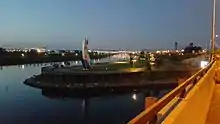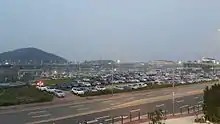Ara Canal
The Ara Canal or Gyeongin Ara Waterway (Hangul: 경인 아라뱃길) is a canal in South Korea, linking the Han River to the Yellow Sea. It extends from Incheon district Seo-gu to Seoul Gangseo-gu. It was built in 2012. The purpose of the canal is to provide flood control and to facilitate leisure pursuits.
| Ara Canal | |
|---|---|
 Part of the bike path | |
| Specifications | |
| Length | 11.184 miles (17.999 km) |
| Locks | West Sea Locks: 2 locks 210 × 28.5 m, 1 recreational lock 35 × 14.5 m; Han river lock 150 x 22 m |
| History | |
| Original owner | Korea Water Resources Corporation |
| Construction began | March 2009 |
| Date completed | 25 May 2012 |
| Geography | |
| Start point | Incheon Seo-gu |
| End point | Seoul Gangseo-gu |
History
Choe I, son of Choe Chung-heon, attempted to construct a canal in the Goryeo period. It failed as it was technologically unfeasible. One of the Joseon kings also tried and failed.
The Gulpocheon river "waterproof road" project was started in 1992. Gulpocheon's limitation was lack of water flow. In particular, there was a flood in the summer of 1987, resulting in six thousand flood victims in the Incheon area. To solve this problem, Gulpocheon waterproofing was undertaken, starting with a five-year survey. In 1995, the Gyeongin canal project was planned, and controversies followed over the next 20 years.
The project was started in 2009 and completed in 2012.[1]
Outline of the Ara Canal project
| Division | Contents |
|---|---|
| Project Section | Incheon Seo-gu Sicheon-dong – Seoul Gangseo-gu Gaehwa-dong |
| Facilities Plan | main Canal: total length 18 km (width: 80 m, depth of water: 6.3m)
Incheon terminal: 244 million(㎡), door of lock: 2 Gimpo terminal: 187 million(㎡), door of lock: 2 Back complex: Incheon terminal back complex, Gimpo terminal back complex[2] |
| Total cost | ₩1.6 trillion (about US$1.4 billion at May 2012 exchange rates) |
| Project period | 2009–2012 |
Controversy
Controversy over the construction of the Ara canal can be traced back to 1995. The Gulpocheon waterproof project was examined according to several scenarios. One scenario was to dig the waterway in such a way as to discharge water into the Yellow Sea. Another was that the municipality of Gimpo would turn the area into a reservoir. Though the latter was more economical, the government selected the former way in order to boost Korea's economy.
The waterway extended in the direction of the Yellow Sea (width: 40~80m, length: 14.2 km). They also constructed a 3.8 km length of waterway to the Hangang river. After long discussion, the government carried forward to private sector investment and Hyudai Engineering & Construction was selected as the main business operator in 1995.
With no economic benefit and a negative effect on the ecosystem, public opinion turned against the project. Business operator and Ministry of Construction and Transportation submitted an 'economic analysis' and demand prediction report to demonstrate the project's validity. As a result, eight reports were made for Gyeongin Ara canal. The cost-benefit report about Gyeongin Ara canal submitted by Korea water resources corporation gained 2.08 and 2.2 scores in 1996. However, when the IMF crisis occurred, the project was cut.
After the IMF crisis passed, the ministry of construction and transportation requested a KDI report of demand prediction and cost analysis in 2002. This time the score was 0.8166 and on reanalysis the score remained below 1. They rejected the report and delayed service cost to adjust report. The KDI resubmitted report by eight scenario including method of main traffic road and whether road charging or not. The result is 0.9223 to 1.2807. However, in 2003, the board of audit and inspection of Korea confirmed inflated result. So they stopped this project and requested disciplinary action.
In August 2004, the ministry of construction and transportation assigned project's report service to Netherlands company and got a 1.76 score in March 2007. In 2008, KDI investigated this report again and submitted score result 1.065. Also predicted the quantity of goods transported in 2011 was 290 thousand 4000 TEU related to container, 6.3 million ton related to sea sand, 5 million ton related to steel, 6 million related to passenger. At this point, 80 percent of container and 53 percent of sea sand are included the quantity of goods transported in yellow sea. Also the tailrace which discharged water to hanyang river was completed in width 80 m. It was decision to consider Ara canal. The member of the national assembly of opposition party said that if government don't consider the Ara canal, the width is enough to 40 m.[3]
This controversy reappeared during the project period. In the summer of 2010, there was damage in the nearby Ara canal region, due to heavy rain. Environment groups insisted that this project has no effect to prevent disaster, like flood or heavy rain. Also they said that the Ara canal has no plan to build 'rain water pump station', 'rain water pipe' and so on. So they demanded that this project be reexamined. But Korea Water Resource Corporation insisted that if the Ara canal has not existed, this had great damage. This damage was due to lack of capacity in pipe conduit. The Ara canal help to prevent a great damage to flow rainwater. Also the Ara canal's role is to flow rainwater to Yellow sea by preventing flood. So installing 'rain water pump station' and 'rain water pipe' and others are not related to this project.[4]
Contents

Scenic views of Suhyang
There are eight scenic views of suhyang. First is "The Yellow Sea" , "Ara Incheon passenger terminal", "Sicheon Riverside", "Ara Waterfall", "Suhyangwon", "Duri Eco Park", "Ara Gimpo Passenger Terminal" and "Ara Hangang Waterside".[5][6]
| Division | main contents |
|---|---|
| Suhyang 2 | Ara light island |
| Suhyang 3 | Sicheon park resting place |
| Suhyang 4 | Ara maru / Ara waterfall |
| Suhyang 5 | Traditional palace |
| Suhyang 6 | Auto camping place |
| Suhyang 7 | The water's edge square |
Bicycle
In "Ara Waterway", there is a 41.3 km bicycle path[7]
There are five bicycle rental shops in Ara Waterway.
(Ara Incheon passenger terminal, southern Sicheon bridge, northern Gyeyang bridge, southern Gyeyang bridge, Ara Gimpo passenger terminal)[8]

Ara Marina
There are three facilities in the Ara Marina region.
The yacht mooring facility accommodates 199 ships (water: 136, land: 58). The marina support facility has a "ship gas station", "ship repair shop", "crane", "inclined plane", "washing room", "sewage disposal". Also in the Ara marine center, there is a convention center, wedding hall and restaurant.[9] In late May, the Gimpo mayor yacht contest is held.
Gyeongin Ara Culture Festival
'Gyeongin Ara Culture Festival' was first held in October 2013. It is a nine-day festival.[10] The program has changed every year. The programs are divided by region, Incheon jeongseojin.
Hyundai premium outlet
The shopping mall opened in February 2015.[11] It is the largest shopping mall in the Ara canal region.
Notes
- Kim(김), Tae Min(태민); Lee(이), Byeong Hyeb(병협) (May 2013). "The past and recent about Gyeongin Ara Waterway... and future(경인 아라뱃길의 과거와 현재, 그리고 미래)". Korean Society of Civil Engineers.
- "Remodeling plan of Gyeongin Ara Waterway". Gyeonggi development research. 2 September 2015.
- "Ara waterway, change, and change until emerging economical". Hankyoreh. 27 October 2013. Retrieved 12 November 2015.
- Choi, jae yong (29 September 2010). "[Incheon, Bucheon] [Focus] controversy of usefulness about under construction of Ara canal". Chosun Ilbo. Retrieved 15 December 2015.
- "If you want to find an unusual view, go to Gyeongin Ara Waterway which connects to Hangang and the Yellow Sea". The Chosun Ilbo.
- "Airport Express: Gyeyang Station". Archived from the original on 30 March 2014. Retrieved 30 March 2014.
- "If you want to find an unusual view, go to Gyeongin Ara Waterway which connects to Hangang and the Yellow Sea".
- "[Friday wide, bicycle trip] masterpiece course in Gyeong gi, Incheon". Gyeongin Ilbo.
- "Introduction of Ara Marina". Waterway plus. Waterway plus. Retrieved 8 November 2015.
- "Opening Gyeongin Ara Culture Festival". Hwangyeong Ilbo.
- "Hyundai premium outlet opened". Gyeongin Ilbo.